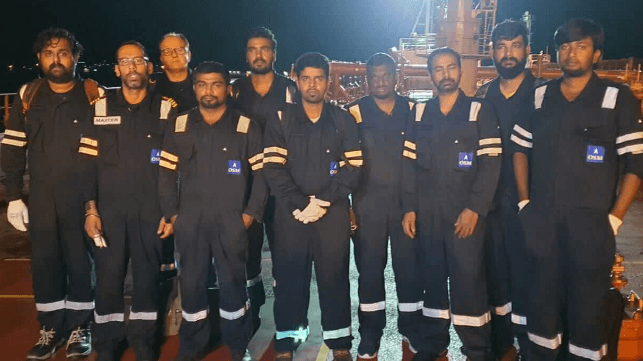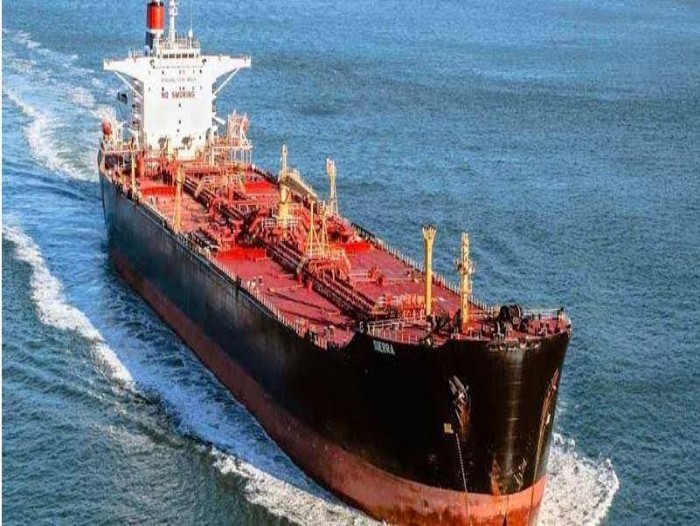
· Does the punishment suit the crime? —Maritime lawyers react
Even though the terms for the release of the 26 crew and vessel of MT Heroic Idun by a Federal High Court in Port Harcourt Rivers state are still sketchy, investigations by Shipping Position Daily have revealed that the Nigerian government may have agreed to a plea bargaining for the release of the crew and the vessel for a sum of about $50 million. This is apart from the $11,000 that was fined the ship for a maritime offence.
Recall that the Federal High Court penultimate Friday ordered an end to the eight-month detention of the vessel and its crew over oil smuggling allegations by the Nigerian Navy in August 2022.
A maritime lawyer and a source privy to the development and the negotiations informed our correspondent that the federal government could not have agreed to a plea bargaining of less than 50 million dollars, citing examples of similar cases in the past. He said the plea bargaining is a fair deal for the two parties.
Also, checks by our correspondent on similar cases in the past, confirmed that the federal government may not have agreed to settle for less than $50 million.
For instance, in the case of the Anuket Emerald Case on March 8, 2015, the 2008 built Panamanian flagged oil/chemical tanker was intercepted by officers of the Nigerian Navy during a routine patrol within Nigerian waters. The vessel was arrested with her 14-man crew, including three Russians, three Ukrainians, seven Filipinos and one Georgian.
They were later arranged along with the two other companies before Honourable Justice Buba of the Federal High Court, Lagos Division, on five counts including conspiracy and illegal dealing in about 1,738.087 metric tons of petroleum products.
After arraignment, each member of the crew was granted bail in the sum of N50 million. Given that each crew member was not Nigerian and would have difficulty in procuring local sureties, the Court granted the acceptance of a bank guarantee of N750 Million as bail bond for the entire crew. Nevertheless, the vessel and the cargo on board were to remain under detention pending the determination of the case.

On March 18, 2016 after a trial that lasted for about for nine months, the Vessel and the other 16 accused persons were convicted of all the counts and they were summarily sentenced – varying periods of imprisonment for the crewmen with a majority of them having the option of fine. Furthermore, the Court ordered that the Vessel and its cargo be forfeited to the Federal Government.
The appeal was unsuccessful as the Court of Appeal (Lagos Division) upheld the convictions and forfeiture of the Vessel.
Also, in the case of MT ‘SAN PEDRO PIO’ CASE (SWITZERLAND v. NIGERIA), ITLOS CASE NO. 27, made an order on July 6, 2019, under Article 290 (5) of UNCLOS, allowing Switzerland to post a bond or other financial security, in the amount of US$14,000,000.00 with Nigeria in the form of a bank guarantee and undertake to ensure that the Master and the three officers of M/T SAN PEDRO PIO are available and present at the criminal proceedings in Nigeria, if the Annex VII arbitral tribunal finds that the arrest and detention of the SAN PADRE PIO, its cargo and its crew and the exercise of jurisdiction by Nigeria do not constitute a violation of UNCLOS.
The tribunal further ordered that upon the posting of this bond or other financial security and the issuance of this undertaking, Nigeria shall immediately release the SAN PADRE PIO, its cargo and the master and the three officers, all of whom were arrested by the Nigerian Navy on January 23, 2018.
Also In 2021, MV SPAR SCORPIO, together with the crew on board, were arrested by the Nigerian Customs Service (NSC) at Tin Can Island Port, Apapa, Lagos, upon the discovery of large quantities of substances suspected to be cocaine on board the ship while she was discharging a cargo of sugar. The NCS agreed to release the vessel’s master and third officer on administrative bail, but the bail was not perfected as the cost of procuring the professional fees charged by the sureties were deemed too high by the vessel owners).
However, the NCS later handed over the case file to the National Drug Law Enforcement Agency (NDLEA) who later released the vessel (though the vessel was never charged) and her crew on administrative bail and upon the provision of a bond in the sum ofUS$1,000,000.00.
Also, a similar scenario played out in the case of MV CHAYANEE NAREE which was arrested in Lagos on October 13, 2021, for carrying substances suspected to be cocaine and an exparte order of interim attachment of the vessel CHAYANEE NAREE to FGN was procured. The CHAYA-NEE NAREE (though never charged) was subsequently released on multi-million dollar bond as procured by her owners and the order of interim attachment was vacated.
However, reacting to the release of the crew and MT Heroic Idun over concerns that the plea-bargaining agreement may have undermined the Nigeria SPOMO Act, maritime lawyers in a chat with our correspondent asserted that the release of the crew and the vessel was the least Nigeria could do in the circumstances. They also affirmed that the bargaining would not undermine the SPOMO Act.
Mrs. Jean Chiazor Anishere; Senior Advocate of Nigeria (SAN) and Principal Counsel, Jean Chiazor & Co. stated that the plea bargaining is a very intelligent move stating that it has in no way undermined the SPOMO Act.
She said: “Don’t forget that their admission and subsequent plea bargain which I consider to be a very intelligent move by their lawyer, attracted some conditions to be fulfilled before they were eventually released.
“In fact, I’m of the opinion that the fear of the tough provisions of the SPOMO ACT, must have necessitated the brilliant move to admit their crime and submit to the option of plea bargain which is provided for under our Criminal law”.
Explaining further, she told our correspondent that: “However, another school of thought could relate the preference of plea bargaining and admission to a smart political move between our country and the flag state of the vessel. Whichever way one looks at it, the important point is that the accused persons did not go away unpunished. The only seemingly flaw which I guess necessitated your brilliant question, is whether the punishment suits the crime? Now, that’s going to open a floodgate of legal opinions I’m afraid.
“Conversely, one could ask whether the punishment is sufficient to deter or prevent future occurrences of such related crimes. Well, I guess that’s where the law is sometimes related to an ‘Ass’” she said.
Speaking also, Barrister Emeka Akabogu an expert in the field of maritime law and Principal Partner at Akabogu and Associates, stated that the release of the crew of the Heroic Idun is within the discretion of the judge, stating that the discretion was exercised judiciously.
He stated that the plea of guilty was a negotiated solution to what was becoming a diplomatic disaster for Nigeria arising from the Navy’s handling of the incident.
He explained that: “The reality is that the plea of guilty was a negotiated solution to what was becoming a diplomatic disaster for Nigeria arising from the Navy’s handling of the incident. The release of the crew was the least Nigeria could do in the circumstances, and would not undermine the SPOMO Act. Indeed, what would undermine it and negatively impact the wider industry is implementation without cognizance of day-to-day operational realities or engagement with verifiable facts.
“We should also be careful not to isolate critical international partners, because the most important element of the Act’s effective implementation is international and regional cooperation”.
A study by our correspondent of the United Nations Convention on Law of the Sea (UNCLOS) reveals that under article 73(2) : “Arrested vessels and their crews shall be promptly released upon the posting of a reasonable bond or other security.”
Also, Article 226(1) (a) and (b) of UNCLOS provides that: a) “States shall not delay a foreign vessel longer than is essential for purposes of the investigations provided for in articles 216, 218 and 220, b) If the investigation indicates a violation of applicable laws and regulations or international rules and standards for the protection and preservation of the marine environment, release shall be made promptly subject to reasonable procedures such as bonding or other appropriate financial security.”
Furthermore, Article 292 of UNCLOS provides that “Where the authorities of a State Party have detained a vessel flying the flag of another State Party and it is alleged that the detaining State has not complied with the provisions of this Convention for the prompt release of the vessel or its crew upon the posting of a reasonable bond or other financial security, the question of release from detention may be submitted to any court or tribunal agreed upon by the parties or, failing such agreement within 10 days from the time of detention, to a court or tribunal accepted by the detaining State under article 287 or to the International Tribunal for the Law of the Sea, unless the parties otherwise agree.
It also states that upon the posting of the bond or other financial security determined by the court or tribunal, the authorities of the detaining State shall comply promptly with the decision of the court or tribunal concerning the release of the vessel or its crew.”
Shipping Position Daily notes that, Nigeria assented to the UNCLOS on December 10, 1982, ratified the treaty on August 14, 1986, and have domesticated the same through the Suppression of Piracy and Other Maritime Offence Act (“SPOMO Act”).
Follow us on Facebook/ twitter















